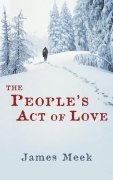James Meek, The People's Act of Love
reviewed by anna battista

Compared to Kafka and Tolstoy, James Meek’s new novel The People's Act of Love might not have much in common with these two authors, but it’s equally an amazing book. Set in a small town in Siberia, Yazyk, in 1919, in post-revolutionary Russia, the novel tells the story of a group of Czech soldiers in charge of the village, while the Red Army is ready to attack it. The main aim of the Czech Legion living in Yazyk is actually returning to Prague as soon as possible, but their commander Matula wants to stay put.
While tensions riddle the Czech army, other sub-plots are woven in: tales of shamanism and cannibalism are mixed with the vicissitudes of a sect of Christian castrates, also known as skoptsy, while the author draws the attention of the reader to three very different love stories – one between Czech lieutenant Mutz, an outsider to his own people since he is a Jew, and beautiful widow Anna Petrovna; between Anna and her ex-husband who has become a castrate; and between rebel and terrorist Samarin and Anna.
As it develops, the story becomes a sort of battle between contrasting forces such as good and evil, hope and despair, life and death, the forces of regeneration and of destruction, doubt and fear, shamanism and religion, humanity and cannibalism.
Themes such as religious fanaticism, war and terrorism, the eternal dilemmas of our times, are at the core of this fable for modern times, which is also a seductive and fabulous epic novel. Yet, the main theme of the book is love: the title of Meek’s novel is a quotation from the book itself (“What looks like evil to a single person is the people's act of love to its future self”) and it’s indeed love that unites the four main characters Anna, Samarin, Balashov and Mutz. The thing that marks the differences between them and sets one against the other is the meaning they give to this word: Anna sees it as the love between a man and a woman, but also as carnal desire; Mutz as the devotion for Anna; Samarin and Balashov have distorted views of love, seeing it as something that goes beyond mere love between a man and a woman, the former conceiving it as an act of cannibalism, the latter as a form of fanatical love for God.
Beautifully written, The People's Act of Love is a well-researched but highly readable novel: historical details about cannibalism, the skoptsy and the Czech Legion in Russia, all topics that Meek thoroughly investigated, are never gruesome or tedious, but are told in a mesmerising style. Meek - also a journalist who has worked for years as correspondent from Moscow, and more recently covered the Iraq war and Guantánamo Bay - displays in this book all his talents, and reconfirms that he is a wonderful storyteller. This is undoubtedly the best novel of the year.
Copyright (c) 2005 erasing clouds |
|